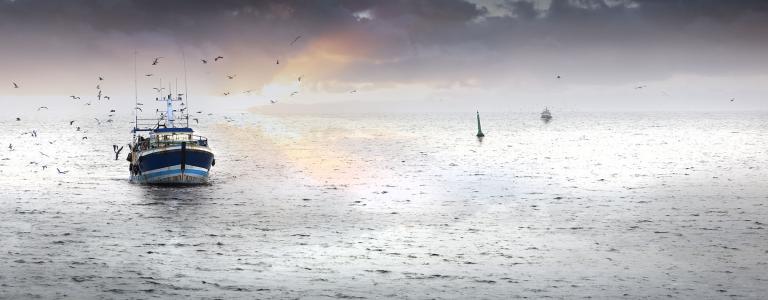France Delays Sanctions Against Britain Amid “Constructive” Talks Over Fishing Rights
Threats to restrict cross-Channel trade have been delayed as talks to defuse a row between France and the United Kingdom over post-Brexit fishing rights begin.
France has agreed to postpone retaliatory measures against the United Kingdom while talks about post-Brexit fishing rights continue, days after threatening to restrict cross-Channel trade.
The announcement by French President Emmanuel Macron came hours before sanctions were to be applied. The spat erupted last month after the United Kingdom and Jersey refused to give permits to dozens of French boats to operate in waters near their coastline. France had threatened to take measures—such as preventing British fishing boats from offloading catches at its ports and stepping up border checks on British goods—unless more licences were granted by midnight, November 1. The row intensified when the French seized a British scallop dredger in French waters last week.
Under the Brexit trade deal, the European Union and the United Kingdom agreed to grant licences to vessels that could prove they had fished in each other’s waters for years. Large trawlers routinely collect this sort of information using things such as data from Automatic Identification Systems. But smaller vessels that come from French harbours to fish around the Channel Islands, for example, struggle to obtain this kind of proof.
Media, including the Financial Times, say Brexit, rather than fish, is at the heart of the clash. The newspaper reported that a leaked letter from French Prime Minister Jean Castex to the European Commission “suggested that it is important to demonstrate to European public opinion that the costs of leaving the EU are greater than remaining.” The British say this proves that France wants to punish the United Kingdom for Brexit while the French say this is a deliberate misinterpretation of the letter, the Financial Times said.
Representatives from the European Commission, France, the United Kingdom, and the Channel Islands began talks on Monday in a bid to defuse the row. European Affairs Minister Clément Beaune said on Twitter that no trade sanctions would be applied before a meeting with British Brexit minister David Frost in Paris on Thursday.
British Environment Secretary George Eustice said there had been a “big de-escalation” of the fight and that talks with France on Monday had been “constructive.”
You might also be interested in
Why Trade Matters in the Plastic–Pollution Treaty Negotiations
The global push to end plastic pollution by 2040 highlights the critical intersection of trade and environmental action, with upcoming INC-5 negotiations focusing on reducing plastic production, consumption, and waste within a fair and effective international framework.
The WTO and Fisheries Subsidies: Where are we, exactly?
What are the latest developments in WTO fisheries subsidies negotiations, focusing on marine conservation, community impact, and sustainable fishing practices? Tristan Irschlinger offers a comprehensive overview explaining key aspects of the agreement, ongoing discussions, and what’s at stake for global fishery sustainability.
IISD Trade and Sustainability Review, October 2024
This edition of the IISD Trade and Sustainability Review presents five unique perspectives on the global governance landscape of digital trade.
Adding Fuel to the Fire: How export restrictions can exacerbate climate change’s impacts on global food security
Higher temperatures will likely reduce agricultural yields and production in most countries, raising global food prices and worsening food security. Avoiding export restrictions is crucial.
